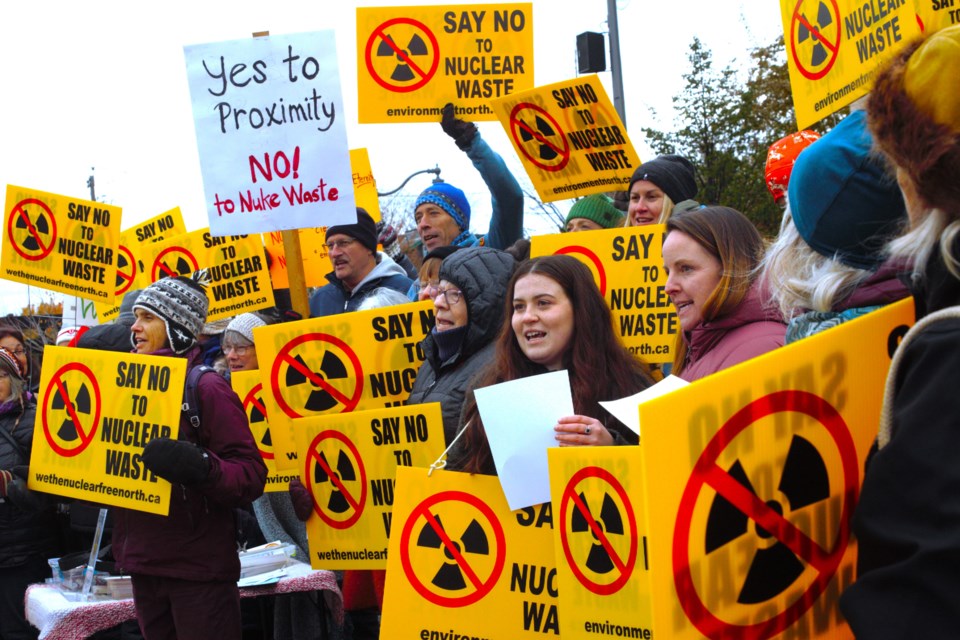THUNDER BAY — In a win for anti-nuclear groups, Thunder Bay’s city council has ordered further consultation before taking a position on the potential transportation of nuclear waste through the area.
The decision came after a demonstration organized by Environment North and We the Nuclear Free North that drew about 50 people to city hall on Monday.
The groups have raised concerns in the face of potential plans to bury nuclear waste deep in the Canadian Shield at Revell Lake near Ignace and Wabigoon Lake Ojibway Nation, about 275 kilometres northwest of Thunder Bay.
Revell Lake is one of two storage sites under consideration by the Nuclear Waste Management Organization (NWMO), the industry group tasked with finding a disposal solution for Canada’s nuclear waste.
The anti-nuclear groups asked city council last year to endorse the “proximity principle,” asserting the waste should be stored closer to where it’s generated in Southern Ontario, and raising transportation safety concerns.
Council’s intergovernmental affairs committee, tasked with examining the groups’ request, had recommended against endorsing the proximity principle.
The recommendation was accompanied by a short letter from chair Coun. Kristen Oliver, but no clear explanation of how the five-councillor committee reached its conclusion.
While the committee received a presentation from the NWMO, the anti-nuclear groups objected they had been shut out of the process.
Responding to that concern, Coun. Andrew Foulds moved to refer the issue back to the intergovernmental affairs committee “to allow further consultation with Environment North and We the Nuclear Free North.”
The motion passed with no votes against and without discussion on Monday.
Dodie LeGassick, nuclear lead for Environment North, welcomed the decision.
“We didn’t feel that due process was followed, in that they didn’t consult with Environment North or We the Nuclear Free North,” she said. “This is a pause, and it gives us time to interact, consult with the committee so that they can get a more balanced perspective on the issue.”
Brennain Lloid of Northwatch, a Northeastern Ontario environmental coalition and part of We the Nuclear Free North, also called Monday’s vote important.
“I’m very encouraged by the decision tonight,” she said. “I think across the North, we’ve really been looking to Thunder Bay for leadership on this. It is the closest large centre to the potential burial site [in Ignace] and it’s also… on the transportation route.”
The groups have pointed to a 1997 plebiscite to bolster their case. Asked if they were in favour of nuclear waste disposal in the Thunder Bay area, over 91 per cent of voters said no at the time.
At Monday’s rally, Peter Lang of Nuclear Free Thunder Bay said that direction shouldn’t be taken lightly by city councillors.
“If they want to be re-elected, I think they should pay attention,” he said.
Asked what fuels his concerns in the face of reassurances from the NWMO, Lang called accidents only a matter of time, given plans to transport multiple truckloads of spent nuclear fuel per day over thousands of kilometres.
“There will be truck accidents, there’s no doubt about it,” he said. “Those shipments are going to go through Northern Ontario, the hills and the curves next to the waterways.”
He feels more needs to be done to inform the public of the risks, and that communities along the transportation route should have a say before a disposal site is chosen.
“What we’d really like is some form of public debate where the citizens can actually listen… and then have some say,” he said.
Vince Ponka, regional communications manager for the NWMO, pointed to what he called the agency's extensive transportation planning in an interview Monday.
“I understand transportation is a big topic of conversation up here, but we’ve been shipping nuclear material around the world for more than 50 years, more than five million kilometres, and there’s never been an accident that’s caused a release of radiation into the environment,” he said. “We’re very confident we can carry out this project extremely safety.”
Ponka said the NWMO is happy to answer further questions from council or participate in public education events, noting transportation of nuclear waste isn’t set to begin for two decades.
“There’s plenty of time for us to work out the details of this huge project, so we’re more than happy to take a little more time talking to city council about [it],” he said.
He sees the potential burial of waste in Revell Lake as an opportunity for the Northwest, not a threat.
“It’s a very important project for all of the Northwest — We’re looking at a 200-year project that will bring 400 to 600 new jobs to the North, and over $20 billion of investment over that time,” he said.
The NWMO is set to decide between the Revell Lake and South Bruce locations for nuclear waste disposal by the end of 2024.
